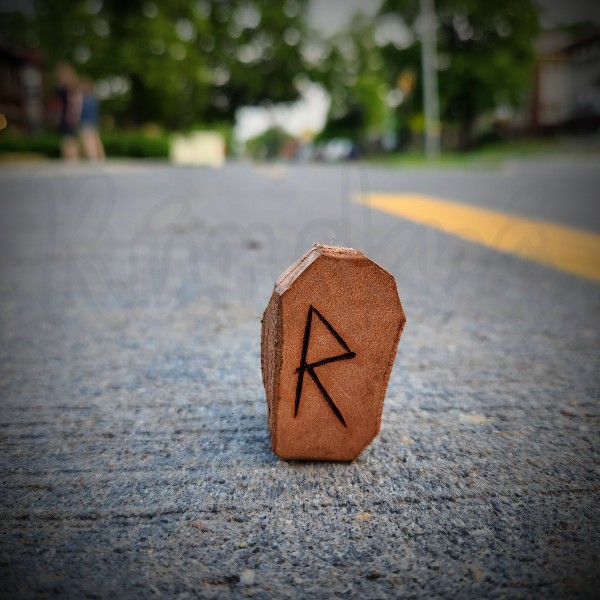
Rune Poems
✦ Old English Rune Poem
Thinking about riding?
Easy enough for earls indoors.
But measure out the miles
on a muscle-bound mount,
out of doors—you’ll learn,
it’s much much harder.
✦ Old Icelandic and Latin
Reið er sitjandi sæla, snúðig fǫr, ok jórs erfiði.
Reið, equitatio: sedentis delectatio, iter præceps, veredi
labor.
✦ Norwegian Rune Poem
Riding is said to be the worst thing for horses;
Reginn forged the finest sword.
✦ Icelandic Rune Poem
Joy of the horsemen
and speedy journey
and toil of the steed.
Raidho (Proto-Germanic Raidō, Icelandic Reið) is the R-rune of the Elder Futhark, the fifth letter in the sequence. Its shape likely derives from the Latin letter R.
The Proto-Germanic root means “ride,” and the rune represents a journey in every sense: a physical road, a life path, a spiritual trajectory. Raidho does not concern itself with the destination. It is about the process of movement and the transformation that happens as you travel.
In Old Norse cosmology, Raidho is associated with the sun’s path across the sky — a reminder that even divine movement follows a course. The Icelandic rune poem breaks the idea of the journey into three parts: the joy of riding, the swiftness of travel, and the labor of the horse. Someone — or something — is always doing the carrying.
You are not walking. You are being borne along. You may guide the horse, but you do not create it, and you do not move without it. This can be read as fate, as infrastructure, as community, or as the accumulated labor of those who came before you. Whether the path is predestined or simply larger than you is a question for philosophers. Raidho asks something simpler: are you paying attention to the ride?
The journey is easier when you are attuned to the horse beneath you. Struggling against it only makes the path more painful. Trust does not mean passivity; it means learning when to steer and when to let the road unfold. You are meant to move. Stagnation is the only failure here.
There is no free ride. The horse bears its own weight and yours. Gratitude matters. Respect matters. When you deny the forces carrying you — fate, community, systems, or your own body — you strain them. Tending the horse is part of the journey.
The Norse gods themselves struggled against fate, attempting to impose order on what they saw as chaos. They gained stories, but not victory. Raidho counsels alignment rather than defiance. Change what you can. Build what you must. But honor the road you are already on.
Keywords: Journey, Travel, Progress, Fate (Urðr), Becoming, Spiritual Growth
Rune Reflections
- Where am I going, and is this truly my path?
- Am I riding in rhythm with life or out of sync with the road beneath me?
- What is carrying me, and am I honoring its labor?
- What does a sacred journey look like in my ordinary life?
- When have I taken the reins, and when have I handed them off?
- What compass do I follow when choices arise?
- What part of my soul is in motion right now?